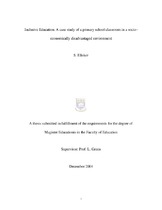Inclusive education: a case study of a primary school classroom in a socio-economically disadvantaged environment
Abstract
In celebrating 10 years of democracy, South Africa has among other things placed even greater emphasis on human rights. The education of those experiencing barriers to learning, where it has been offered, has historically been separate from general education. The right to inclusive education is currently an international concern and can be viewed as one of the many initiatives that could steer this country into the future. However, other demands also highlighted in this research, make it difficult for ordinary schools to take up the challenge. The primary aim of this research was to investigate current conditions in one typical South African classroom in a disadvantaged area, with reference to inclusion. The study took place at a primary school and attempts to provide a rich description of the school, classroom, educator and learners. The context described is one likely to be familiar to many educators. The study identifies and portrays in detail the range of barriers to learning present in a particular classroom and describes the educator and methods used to accommodate learners.
The findings indicate that this educator’s classroom can to a certain extent be described as an inclusive classroom and some of the strategies used to accommodate learners are in line with inclusive practices. The final discussion raises a number of important issues with respect to barriers to learning, curriculum, educator training and school support. It is hoped that this study will highlight key issues and possible solutions that could facilitate the implementation of inclusion in South Africa.

